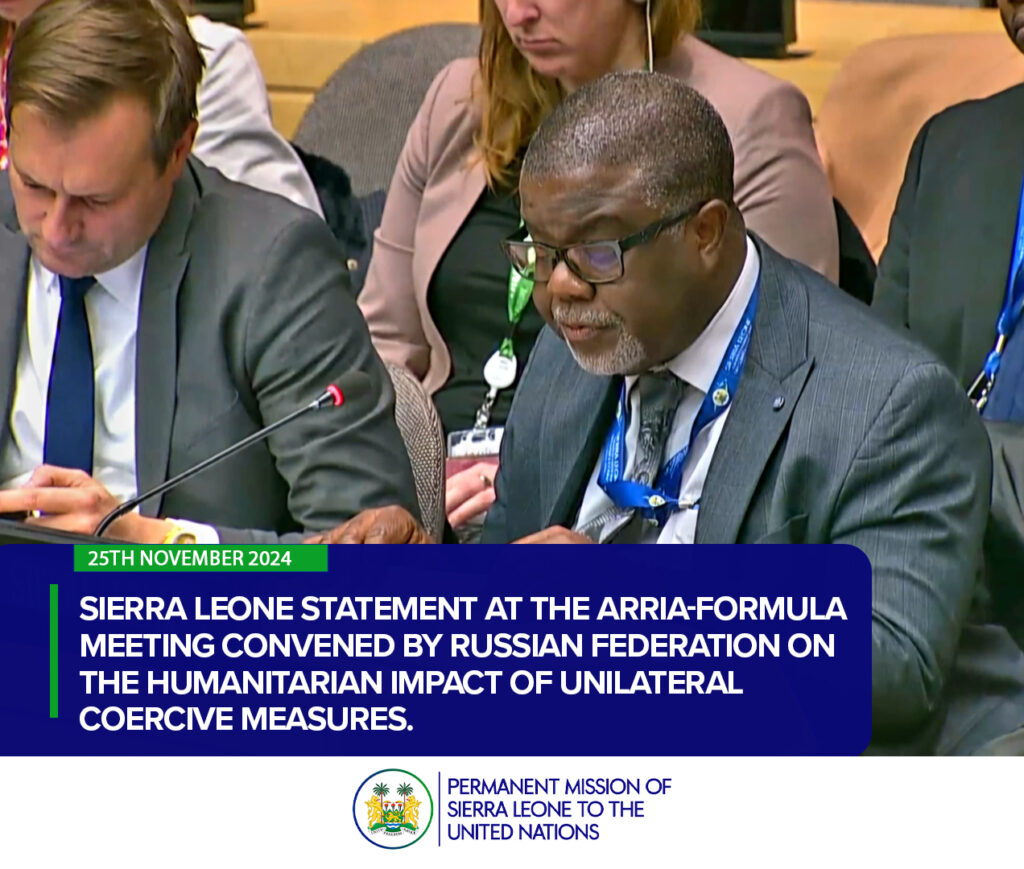STATEMENT BY
H.E. MR. AMARA S. SOWA
AMBASSADOR / DEPUTY PERMANENT REPRESENTATIVE
CHARGE D’AFFAIRES A.I.
Thank you, Mr. Chair.
Let me start by acknowledging the contributions of the briefers, Ms. Alena Douhan, Special Rapporteur on the Negative Impact of Unilateral Coercive Measures on the Enjoyment of Human Rights; Mr. Ivan Timofeev, Director General of the Russian International Affairs Council; and Mr. Emmanuel Tronc, Syria Mission Country Director at HEKS/EPER.
Sierra Leone acknowledges that States have the right to determine their foreign policies, including shaping their economic relations and taking measures to protect national security interests. Such actions are considered as legitimate, when taken in accordance with diplomacy and international law.
As a State deeply committed to the principles of peace, justice, and respect for human dignity, Sierra Leone’s foreign policy and recent history have been shaped by multilateralism and the pursuit of international cooperation under the United Nations (UN) Charter and international law. Having once relied on international solidarity for peace and recovery, we remain concerned about the consequences of unilateral actions that undermine the international rule of law and the spirit of multilateralism.
The legitimate application of measures, including sanctions, can be an effective tool, whether unilateral or multilateral, to address malign behavior, counter transnational crime, terrorism, the proliferation of weapons of mass destruction, and human rights violations.
Sierra Leone recognizes that there are differing views on the use of unilateral coercive measures (UCMs). Proponents argue that UCMs can be instrumental in promoting accountability for human rights violations and in addressing threats to peace and security. It is also claimed that they can incentivize positive behavioral change in targeted States.
Sierra Leone, however, emphasizes that any imposition of unilateral measures must be carried out within the framework of the UN Charter and in full compliance with international law. We believe that it is only through multilateral diplomacy, guided by international law and supported by UN mechanisms, that we can effectively address global challenges while respecting the rights and dignity of all peoples.
In addition, we stress the need for greater transparency and accountability in the imposition of coercive measures. Such actions must be based on clear legal grounds, in full compliance with the Charter and international law, and with careful consideration of their humanitarian impact. Sanctions should be designed to contribute to peace and stability while safeguarding the well-being of civilians and upholding international human rights standards.
While acknowledging the arguments in favor of UCMs, it is crucial to recognize that their impact on civilian populations, even when well-intentioned, often has unintended consequences. These measures can lead to economic hardship, social instability, and increased vulnerability to radicalization, potentially undermining efforts to combat terrorism and exacerbating security challenges. UCMs, while intended to target specific actors, often extend their reach to innocent civilians, disproportionately affecting the most vulnerable.
It is also important to recall that both the UN Security Council and the General Assembly have acknowledged the negative impact of UCMs on human rights, the right to development, and international solidarity. The General Assembly, in resolution 78/202, has specifically highlighted that the extraterritorial application of laws can create obstacles to the full realization of human rights. Furthermore, people should not be deprived of their means of subsistence, particularly in relation to food and medicine.
In this regard, UN Security Council Resolution 2664 underscores the need for humanitarian carve-outs in sanctions regimes, ensuring that humanitarian aid can reach those in need while safeguarding against its diversion by malicious actors.
Sierra Leone calls for full adherence to the UN Charter and international law in the application of sanctions or any other coercive measures. If sanctions are deemed necessary, they must be targeted and designed to minimize harm to civilian populations, support sustainable peace, and uphold the principles of the UN Charter.
We also urge States to refrain from imposing coercive measures with extraterritorial effects, as these actions disrupt trade relations among States and impede the full realization of rights set forth in the Universal Declaration of Human Rights, including the right to development.
We call on member States and regional organizations to ensure that their measures are truly targeted and minimize any potential humanitarian impact on vulnerable communities, in order to achieve their intended goals effectively.
In conclusion, Mr. Chair, Sierra Leone supports the recommendation that sanctions measures, when legitimately adopted as UCMs, should be designed to impact only the intended targets while limiting unintended consequences for innocent civilians. The implementation of sanctions must be regularly reviewed to assess their real-world impacts on human rights, and appropriate human rights safeguards, including independent monitoring and impact assessments, should be incorporated. Sanctions should also be time-limited and reassessed for their ongoing effectiveness.
Furthermore, States imposing sanctions must fully comply with international law, ensuring due process and providing mechanisms for effective review and remedy. They must also establish clear and universally accepted systems for humanitarian exemptions, enabling the swift passage of essential goods, such as food, medicine, and healthcare supplies, to those in need and to critical infrastructure that supports human rights, including water, sanitation, and electricity.
I thank you.



